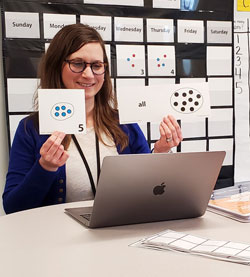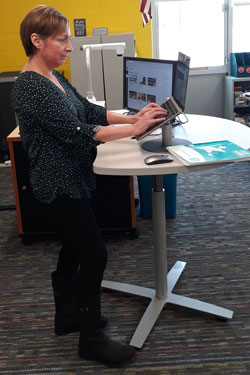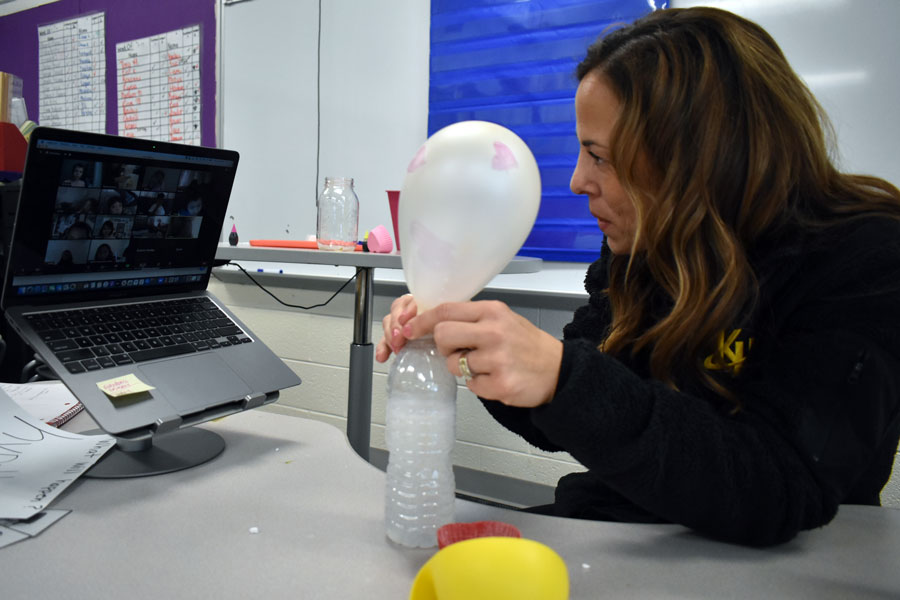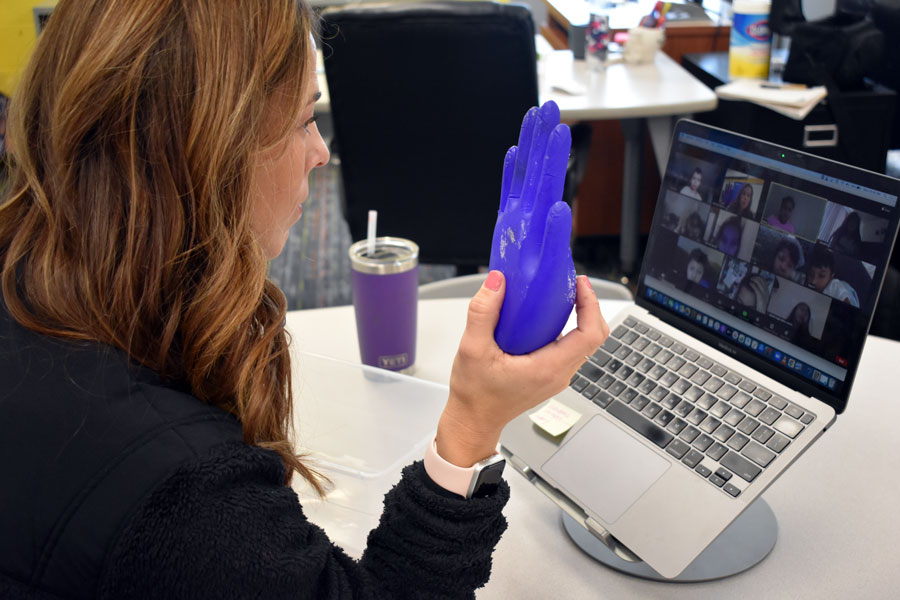Kenowa Hills — The walls of Michele Dykstra’s classroom at Alpine Elementary are decorated with world maps and numbers, with books about the states of matter on the ledge of her whiteboard. At first glance, the room appears to be missing its second-graders, but there they are on Dykstra’s laptop, learning from home via Zoom.
As a Kenowa Hills Online Learning Academy teacher, Dykstra needs to prepare her live science experiments before starting her morning call with students.
“We’re learning the states of matter, gases, liquids and solids, and I have a few demonstrations to show my kids how the states transition from one to another,” she explained.
Online teachers have learned resilience and are reimagining how they engage their students outside of the traditional classroom setting, say Dykstra and some of her academy colleagues.
“Whether you like it or not, it’s like going back to your first year of teaching,” KHOLA kindergarten teacher Amy Sherwin said. “We don’t know what ‘best practice’ always is in a virtual setting, but we all want to do what’s best for kids.”

Over a Zoom call with Dykstra and Sherwin, first-grade KHOLA teacher Wendy Maxwell talked about experiencing internet connection problems while teaching over Zoom. Despite the unexpected setbacks, she reminded herself that even as the teacher she is still learning.
“When I make mistakes I own it and ask for patience from my students to set a good example,” Maxwell said. “Sometimes as teachers we struggle too, and I hope it’s teaching my students resilience.”
Maxwell said instructors had no official online curriculum at the beginning of this school year.
“Our full curriculum for online learning did not start until two weeks ago. Up until then, we started from scratch and used Kent County K-5 curriculums to create a plan together.”
KHOLA teachers collaborated with the district to create a plan for virtual students to get the most from their learning, while remaining flexible as plans changed.
“We didn’t have training for this,” Maxwell said. “When I went to college to be a teacher I didn’t know I would have to be teaching on video where everyone can be critiquing everything about you and flipping everything you’ve previously done to fit on a computer screen.”
Creating Connections on Computers
Sherwin and her online academy colleagues discussed the importance of cultivating a space to connect with students in virtual classrooms.
“As a kindergarten teacher, the relationships you build with your students and that they build with each other are so important,” Sherwin said, “It’s been humbling to see those relationships can be created in a virtual setting. I think having daily contact with our students is one of the positives.”
With virtual learning, students and their families invite their teacher and fellow classmates into their homes, Sherwin pointed out. She expressed gratitude for daily contact with families when needed.
“A lot for our families are eager for what we’re giving them,” Maxwell said. “Between Zoom, phone and email, we’ve had more contact with parents than ever before.”
Faced with the inevitable technical difficulties, KHOLA teachers have learned to work alongside families to solve what they can and be OK with the problems they cannot solve.

“We see the parents trying, and we’re really trying too,” Maxwell said. “Having real vulnerability between teachers and parents has made things easier and more comfortable, and parents are so appreciative for the help.”
Sherwin said she practices showing herself grace when things get challenging or unexpected difficulties occur while online, and believes in having reciprocal grace between the teachers and parents.
“We’re not trying to be experts,” Maxwell said. “We look at screens from the morning until night all week long, and that is not what our job normally looks like.
Despite the learning curve of teaching online, KHOLA teachers say they are determined to create a memorable and educational virtual experience for their students.
“The kids are happy to be there and happy to spend time with us,” Maxwell said. “Sometimes we film individual videos to send back and forth with the students to chat and share what’s going on in their lives outside of Zoom classes.”
Maxwell and her colleagues agreed they wanted their KHOLA students to enjoy learning virtually and have some fun in their Zoom classrooms. Dykstra assigns themes to her Zoom classes to help students get excited about online learning.
“Themes like Funny Friday, where I prepare jokes to tell students and they can share their own, help engage them over Zoom,” Dykstra said. “I’m constantly changing things up to keep our lessons interesting.”
Maxwell also strives to include online students in assemblies and other events happening in person.
“I try to sprinkle fun throughout our online learning sessions so it’s not always just the lesson plan,” Maxwell said. “We also have school spirit weeks virtually and send crafts home for the holidays to allow them to enjoy being kids.”
Vulnerabilities
Reflecting on the last year, KHOLA teachers say they take pride in how they’ve learned from one another’s successes and shortcomings. They say collaboration helps them become stronger teachers.
“Being an online teacher has made me realize how precious instructional time is and how impactful I am on the students right in front of me,” Sherwin said.
All three teachers also spoke about their moments of vulnerabilities during and outside of virtual instruction.
“In the beginning, I used to do my videos over and over until I thought they were good,” Dykstra said. “Now, I’m not starting over as many times and giving myself grace to be uncomfortable on camera.”
Added Maxwell: “We’re doing something that’s never been done before,” Maxwell said. “It’s been heavy lifting for our teachers and I’m really proud of what we’ve created.”













